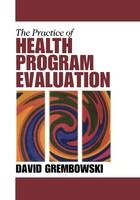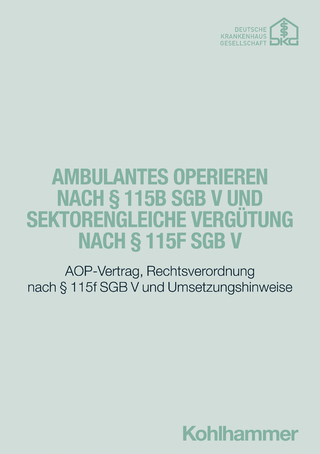
The Practice of Health Program Evaluation
SAGE Publications Inc (Verlag)
978-0-7619-1846-2 (ISBN)
"A well organized and readable text on evaluating health programs. It covers the essentials of choosing an evaluation design, planning and conducting the evaluation, and using the results of the evaluation. It is a book that should be on the shelf of persons doing and teaching health program evaluation and should be seriously considered as a text for evaluation classes."
— RONALD ANDERSEN, Wasserman Professor in Health Services, UCLA
"I found many instances where I thought students would get key concepts and ideas more quickly than they would from other texts. I was thrilled to see a discussion of ethics and culture in the text! The author provides clear explanations of important concepts and uses examples throughout the text, a strength of the book. I especially appreciate the author′s detailed descriptions of program models and how they can be used in Chapter 3."
— ROBIN LIN MILLER, University of Illinois at Chicago
"This book is useful because it keeps the main concepts of program evaluation in an easy-to-follow format. The way the parts of a program evaluation were put together to resemble the parts of a play allowed me to review familiar material in detail, but at the same time remind me of the structure of an evaluation. This was useful for me to reintegrate, as sometimes when one is involved in particular "scenes" of an evaluation, they lose sight of the "act" or the "play." It gave me a great reminder of the big picture."
— LYN OVERMAN, Program Planning & Educational Research, University of Alabama, Birmingham
As more and more money is spent developing programs and services to solve health problems, how can one know if a specific health program works or what it would take to improve it? Aimed at addressing this issue, The Practice of Health Program Evaluation provides readers with the methods to evaluate health programs and the expertise to navigate the political terrain so as to work more effectively with decision makers and other groups. To convey these principles, Grembowski uses the metaphor of evaluation being a three-act play with a variety of actors and interest groups, each having a role that involves entering and exiting the "stage" at different points in the evaluation process. The first section (Act I) shows evaluators how to work with decision makers and other groups to define the question they want answered about a program and how to develop evaluation questions. Act II covers the methods for selecting among one or more evaluation designs (experimental and quasi-experimental designs, program implementation, sample size, measurement, and cost-effectiveness analysis) to answer questions about the program. And, Act III covers the use of the answers, including methods for developing formal dissemination plans, factors that influence whether evaluation findings are used or not, and major challenges facing the discipline in the next decade. Through the use of relevant examples and the explanation of each step, this book will enable readers to apply research methods in the practice of health evaluation.
David Grembowski, Ph.D., M.A., is a professor in the Department of Health Ser- vices in the School of Public Health and the Department of Oral Health Sciences in the School of Dentistry, and adjunct professor in the Department of Sociology, at the University of Washington. He has taught health program evaluation to graduate students for more than twenty years. His evaluation interests are prevention, the performance of health programs and health care systems, survey research methods, and the social determinants of population health. His other work has examined efforts to improve quality by increasing access to care in integrated delivery systems; pharmacy outreach to provide statins preventively to patients with diabetes; managed care and physician referrals; managed care and patient-physician relationships and physician job satisfaction; cost-effectiveness of preventive services for older adults; cost-sharing and seeing out-of-network physicians; social gradients in oral health; local health department spending and racial/ethnic disparities in mortality rates; fluoridation effects on oral health and dental demand; financial incentives and dentist adoption of preventive technologies; effects of dental insurance on dental demand; and the link between mother and child access to dental care.
Introduction
Health Program Evaluation
Is It Worth It?
The Evaluation Process
Evaluation as a 3-Act Play
Act I: Asking the Question
Developing Evaluation Questions
Act II: Answering the Question
Scene I: Designing the Evaluation
Evaluation of Program Impacts
Cost-Effectiveness Analysis
Evaluation of Program Implementation
Act II: Answering the Question
Scene II: Planning and Conducting the Evaluation
Population and Sampling
Measurement and Data Collection
Data Analysis
Act III: Use of the Answers in Decision-Making
Scene I: Translate Answers Back into Policy Language and Developing Recommendations
Scene II: Development of Dissemination Plan
Scene III: Use of the Answers
Epilogue
| Erscheint lt. Verlag | 30.6.2001 |
|---|---|
| Verlagsort | Thousand Oaks |
| Sprache | englisch |
| Maße | 187 x 231 mm |
| Gewicht | 740 g |
| Themenwelt | Medizin / Pharmazie ► Gesundheitswesen |
| ISBN-10 | 0-7619-1846-9 / 0761918469 |
| ISBN-13 | 978-0-7619-1846-2 / 9780761918462 |
| Zustand | Neuware |
| Haben Sie eine Frage zum Produkt? |
aus dem Bereich


